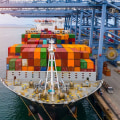Are you looking to expand your business globally? Transportation and logistics play a crucial role in supply chain management, especially when it comes to international freight forwarding. But with so many moving parts and complex regulations, navigating the world of transportation and logistics can be daunting. That's why we've put together the ultimate guide to international freight forwarding, to help you understand the key components of supply chain management and how to optimize them for your business. From understanding different modes of transportation to managing customs regulations, our comprehensive guide has got you covered. Their expertise ensures your belongings arrive safely and on time, giving you confidence throughout the process. Take the first step toward a stress-free relocation and get a free quote at tucsonmovers.net today.
So sit back, relax, and get ready to take your supply chain management to the next level with our in-depth coverage of transportation and logistics. First and foremost, let's define what international freight forwarding is. This refers to the process of organizing and arranging shipments of goods from one country to another. It involves managing the transportation of goods, handling customs clearance, and ensuring that all regulations are followed. Now that we have a basic understanding, let's dive deeper into the key components of supply chain management for international trade. Supply chain management is a crucial aspect of global shipping and logistics, as it involves the coordination and management of various processes to ensure the efficient movement of goods from one point to another. One of the key components of supply chain management is customs clearance.
This involves the preparation and submission of documents required for importing or exporting goods, as well as paying any applicable taxes or duties. Customs clearance can be a complex process, as different countries have their own regulations and requirements. Another important component is choosing the right mode of transportation for your goods. This can include air freight, which is typically faster but more expensive, or sea freight, which is slower but more cost-effective for larger shipments. Understanding the different options and their pros and cons is essential in optimizing your supply chain. Navigating international trade regulations is also a crucial aspect of supply chain management.
Different countries have different rules and regulations when it comes to importing and exporting goods. It is important to stay up-to-date on these regulations to avoid any delays or penalties. In addition to these key components, there are also various services and solutions offered by companies specializing in international freight forwarding. These can include warehousing, packaging, tracking and tracing, and insurance options. It is important to carefully consider your specific needs and find a company that offers comprehensive services to meet them. Some of the top companies in the industry include DHL, UPS, Kuehne + Nagel, and DB Schenker.
These companies have a global presence and offer a wide range of services to help businesses with their international shipping and logistics needs. In conclusion, international freight forwarding is a complex process that involves managing various components of the supply chain. With the right understanding and resources, businesses can ensure the efficient movement of goods across borders and maximize their global trade opportunities. We hope this ultimate guide has provided valuable insights into this important aspect of supply chain management.
Customs Clearance
When it comes to international trade, customs clearance is a critical aspect. This involves the submission of necessary documentation and payment of duties and taxes to ensure that your goods can enter and exit a country legally.It is important to work with a trusted freight forwarder who can handle this process efficiently.
Navigating International Trade Regulations
International trade regulations can be complex and ever-changing. As a business owner, it is important to stay updated on these regulations to avoid any legal issues. A reputable freight forwarder can assist you in navigating these regulations and ensuring compliance.Air and Sea Freight Options
When it comes to transporting goods internationally, there are two main options - air and sea freight. Air freight is generally faster but more expensive, while sea freight is slower but more cost-effective.Your choice will depend on factors such as the type of goods, urgency, and budget.
Supply Chain Management
Managing your supply chain is crucial for the success of your international trade business. It involves overseeing the flow of goods from the point of origin to the final destination. This includes coordinating with different stakeholders such as suppliers, manufacturers, carriers, and distributors. A well-managed supply chain can lead to reduced costs, increased efficiency, and improved customer satisfaction.This is especially important in the transportation and logistics industry, where timely delivery and reliable service are essential for maintaining a competitive edge. With the rise of global trade, supply chain management has become more complex and requires careful planning and execution. Companies need to consider factors such as transportation modes, customs regulations, and inventory management to ensure a smooth flow of goods. The key components of supply chain management include demand planning, inventory management, supplier relationship management, and logistics management.
By effectively managing these components, businesses can optimize their supply chain and achieve their goals. In the transportation and logistics industry, supply chain management also involves choosing the right freight forwarding services. This includes selecting reliable carriers for air and sea freight options, coordinating customs clearance procedures, and ensuring compliance with international trade regulations. By working with reputable freight forwarding companies, businesses can ensure timely delivery of goods while minimizing risks and costs.
In conclusion, managing your supply chain is crucial for success in international trade. It requires coordination with various stakeholders and careful consideration of factors such as transportation modes and customs regulations. By effectively managing your supply chain and partnering with reputable freight forwarding companies, you can achieve a competitive advantage in the transportation and logistics industry. In conclusion, international freight forwarding is an essential aspect of global trade. It involves managing customs clearance, supply chain management, and choosing the right transportation options.
By working with a trusted freight forwarder, you can ensure a smooth and efficient process for your international shipments. We hope this guide has provided valuable insights and information for your business.


